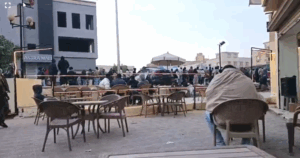New displaced in Darfur, Nuba Mountains still waiting for aid
Tens of thousands of people who fled attacks on their villages in West Darfur and in South Kordofan during the past weeks are in dire need of humanitarian assistance. Three farmers were killed near Delling in South Kordofan on Wednesday. According to Yasir Arman, rebel leader and former political advisor to PM Abdallah Hamdok, the ongoing violence in Darfur and the Nuba Mountains is directly linked to the October 25 military coup.
 Dalami in the Nuba Mountains, South Kordofan (Abdelrahim Kunda / RD)
Dalami in the Nuba Mountains, South Kordofan (Abdelrahim Kunda / RD)
Tens of thousands of people who fled attacks on their villages in West Darfur and in South Kordofan during the past weeks are in dire need of humanitarian assistance. Three farmers were killed near Delling in South Kordofan on Wednesday. According to Yasir Arman, rebel leader and former political advisor to PM Abdallah Hamdok, the ongoing violence in Darfur and the Nuba Mountains is directly linked to the October 25 military coup.
Activists have declared West Darfur “a disaster state” and call for urgent action to help those affected by the fierce violence that recently took place in Jebel Moon, Kereinik, and Sirba.
The Jebel Moon Initiative, a popular initiative to aid those affected, said that the total number of people whose villages burned to ashes during attacks in November and December amount to at least 22,200. Many villagers sought refuge in the mountains in the area. Others fled to the Darfur-Chad border area of Saneid, or to Saliha.
Mohamed Ali, a member of the Jebel Moon Initiative, described the conditions of the displaced in the area as “very bad”. In a press conference in the West Darfur capital of El Geneina on Wednesday, he said that “most displaced are living in the open. They fled their burning homes and couldn’t take anything with them”.
According to Ali, the Jebel Moon displaced have not received much aid so far, not from relief organisations nor from the Sudanese authorities. He said that the delay can also be attributed to the continuing insecurity in the region.
An aid convoy of the Jebel Moon Initiative did manage to reach Goz Minni in Jebel Moon. Abdallah Ishag, member of the initiative, described the situation there as “dangerous and unspeakable”.
In the press conference after the convoy’s return to El Geneina, Ishag told reporters that 373 families sought refuge in Goz Minni. “They have dug holes in the ground to protect their children from the cold.” He added that “despite all this suffering, no international or national organisation or the government has yet reached this stricken area”.
The attacks on Kereinik town and surrounding camps has led to the displacement of 10,550 families (63,306 persons), Ahmed Ismail, from the Kereinik Initiative reported in the press conference.
They sought for shelter in schools and public squares, he said. “Many children are suffering from colds, malaria, and malnutrition, while there is a complete absence of health care and medicines.”
Abdellatif Fadel, a member of Sirba Initiative, said that “at least 800 families fled from repeated attacks by gunmen in eastern Sirba to neighbouring Saraf Omra in North Darfur.
Hatem Abdallah, leading member of the National Initiative for Jebel Moon and Kereinik, said that “the violence in West Darfur is not caused by tribal conflicts as it is currently reported in the media”.
He stated in a press conference in El Geneina that “all indications show that the attacks have been planned out of malice and greed”. He pointed to groups of gunmen who are now imposing sums of money on villagers for their protection.
OCHA
“Most of the affected people are yet to receive support either due to continuing insecurity or due to limited humanitarian presence and resources in some parts of the region,” the UN Office for the Coordination of Humanitarian Affairs (OCHA) in Sudan said on Darfur in its Situation Report yesterday.
Humanitarian organisations are collating available information to understand the number of people displaced and in need of humanitarian assistance. The priority needs of the displaced people in Darfur include protection, shelter and non-food items, and food assistance.
South Kordofan violence
In the Nuba Mountains, South Kordofan, about 2,000 people fled the violence in the area of Kedber in Dalami, while fighting in Rashad (formerly Abu Jubeiha) locality have displaced 13,600 people, OCHA stated. Food and non-food items are the most urgent needs.
The Humanitarian Aid Commission (HAC) in South Kordofan reported yesterday that the results of a first field survey round into the consequences of recent violence in Dalami show that more than 2,161 families (13,650 individuals), fled their homes.
Following a joint meeting of representatives of the UN Refugee Agency (UNHCR), other UN agencies, and Sudanese partners in Kadugli, capital of South Kordofan, yesterday, HAC South Kordofan Director Rawya Kamal told reporters that the organisations promised to urgently intervene, and provide in particular health care and protection for the people affected by the violence.
Nuba farmers killed
Three farmers were killed west of Jebel Abu Doma near Delling in South Kordofan on Wednesday.
Relatives of the dead told Radio Dabanga that a group of gunmen entered the Gum Arabic farms and shot at the farmers tending the crops. El Sadig Daldoum and Ismail Merka were killed instantly, while Abdelrazeg Jabouri died of his wounds in the Delling Teaching Hospital on Thursday.
The sources said that another shooting took place in the same area on Wednesday, when armed herders attempted to graze their livestock on farms, but they could not provide details.
Violence ‘related to military coup’
According to Yasir Arman, leading member of the Sudan People’s Liberation Movement faction led by Malik Agar and political advisor to PM Abdallah Hamdok, the ongoing violence in Darfur and the Nuba Mountains is directly linked to the October 25 military coup.
In a press conference of the Forces for Freedom and Change in Khartoum yesterday, Arman said that what is happening in Darfur and South Kordofan has nothing to do with tribal conflicts, but with the control over resources by certain parties in Khartoum.
He further said that the coup constitutes a direct threat to the Juba Peace Agreement because it cancelled the political framework as stipulated in the accord.
Arman expressed his hope that the Sudanese people will unite despite the coup, and the military and civil institutions will cooperate again. “In the end, we shall find a formula that suits us all and that achieves a civilian, democratic leadership for our country”.











 and then
and then